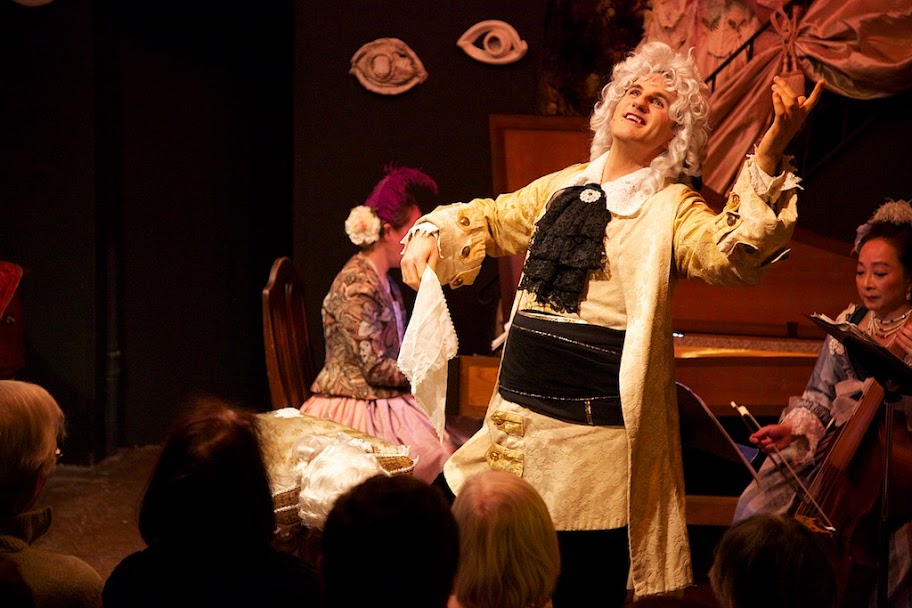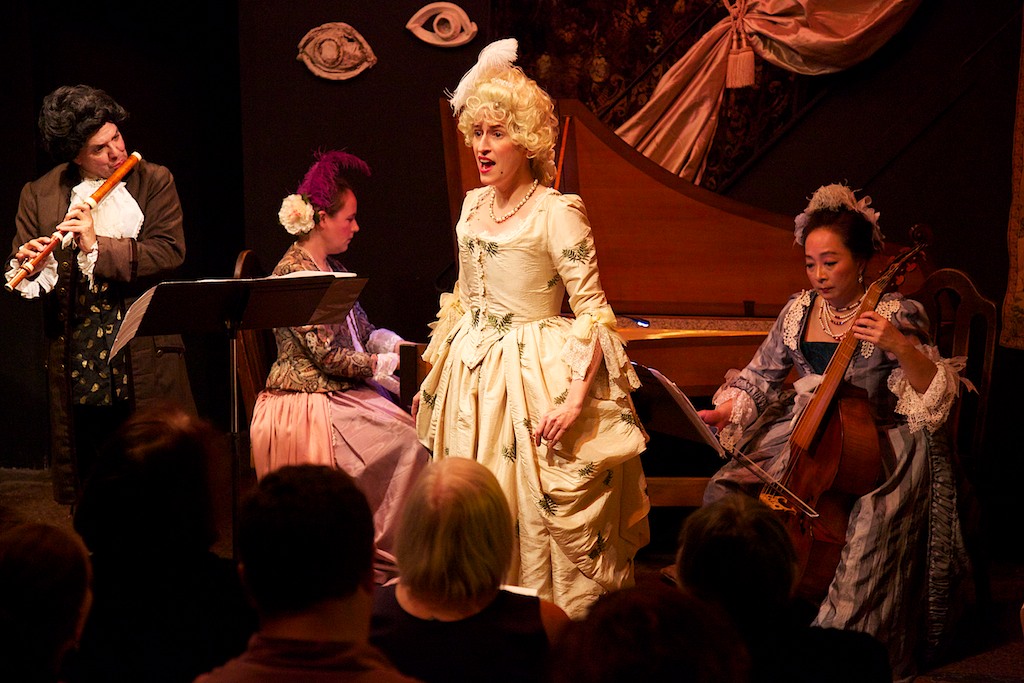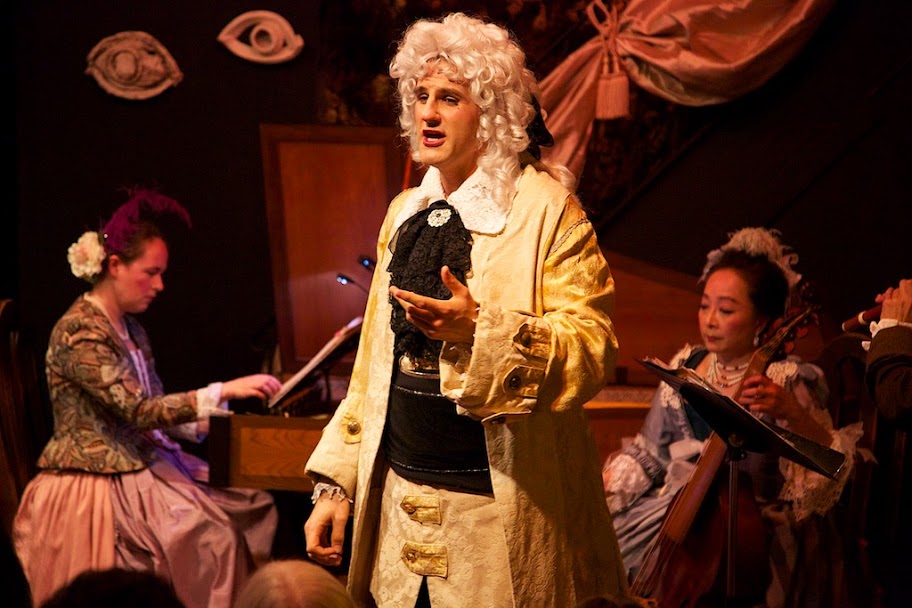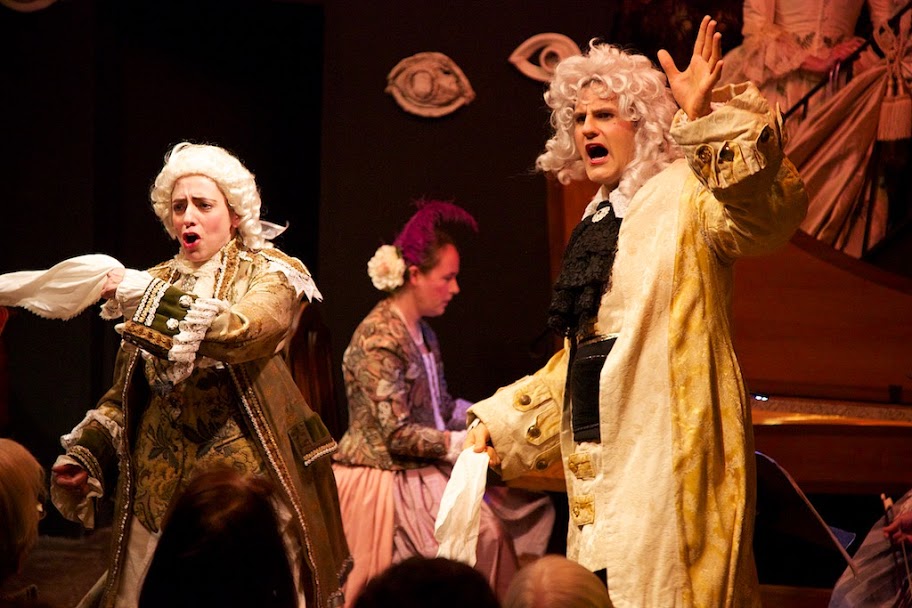Incontro Barocco is our nod to a salon concert, a kaleidoscope of short solo instrumental and vocal works trespassing across genres, styles and national boundaries. Singers and instrumentalists alike are lavishly costumed in High Baroque style, and the audience is shown more than a glimpse of the 'backstage' relationships, repartee and rivalries among the players. Semi-staged and Costumed.
Forces for Incontro Barocco:
- 3 (or more) singers
- 3 (or more) piece chamber ensemble
Running Time:
- flexible
Incontro Barocco has been presented at Columbia University and Vertical Player Repertory.







+ Program Notes
Incontro Barocco (Baroque Encounter) began as a simple concert, but soon developed a life of its own — like all things Feroce.
Inspired by the model of the baroque salon where overdressed people gathered to eat, drink and listen to overdressed performers, we added period costumes for all performers, and asked the audience to participate as well. We brought food and drink. And in the process of performing, on-stage relationships developed, and the ‘concert’ became a peek into an imaginary circle of friends and rivals, vividly brought to life in song.
+ Program
(AS performed on April 6 & 7, 2013)
Udite amanti Luigi Rossi (1597/8 – 1653) Sig.ri Hatton, Dornak & DeWitt “Listen up, lovers! The Goddess of Love issues today a challenge to mortal combat. Arm yourselves, if you dare.”
Ohimè dov'è il mio ben, romanesca a 2 Claudio Monteverdi (1567 – 1643) Sig.ra Hatton & Sig.? DeWitt “Where is my heart’s true love? Who has taken her from me?” “Only the desire for honor can transform this suffering.” “Over-reaching ambition had more power over me than did my love.” “Cruel, blind world! Because of you I take my life.”
Mi palpita il cor, solo cantata G. F. Händel (1685 – 1759) Sig. Dornak “Ah! I am miserable (and long-winded) because the beautiful, but heartless, Clori doesn’t know I exist. Oh God of Love, if you cause her to suffer as much as I do, I will never cease worshipping at your shrine!”
Sonata in e minor for flute, movement 1, grave Friedrich der Große (1712 – 1786) Sig. Trent Baroque flute players everywhere are eternally grateful to Prussian king Frederick the Great, the Warrior Flutist, an “Enlightened Despot” in the music salon as well as on the battlefield.
The soft complaining Flute, from Ode for St. Cecilia’s Day Händel
Sig.ra Hatton
Nei giorni tuoi felici,from the opera L’Olimpiade Antonio Vivaldi (1678 – 1741) duetto di Megacle e Aristea Sig.ra Barnes & Sig. DeWitt a lovers’ quarrel in 3/8 time
Temi lo sdegno mio, from the opera Arminio in Armenia Nicola Porpora (1686 – 1768) terzetto di Norberto, Arminio e Tusnelda Sig.ri Hatton, Dornak & DeWitt Norberto: “Fear my wrath, oh vile one”! Arminio: “Not on your life!” Tusnelda: “Ah! Ah!” Norberto: “You’ll beg for my mercy!” Arminio: “Never!” Tusnelda: “Ah! Ah!”
INTERMISSION
Sù sù sù pastorelli vezzosi Monteverdi
Sig.ri Hatton, Dornak & DeWitt
a wordy, bucolic offering involving shepherds, birds, fountains, flowers, fields, and a sunrise
La Pastorella lascia la villa, from the solo cantata Freme il mar Porpora
Sig. DeWitt
Continuing in the same pastoral vein as the preceding number, the shepherdess leaves the village to gather roses and the shepherd leaves his flock to follow her. Meanwhile in the avian realm, the turtledove flies the coop in search of its mate.
Sound the Trumpet, from Come Ye, Sons of Art Henry Purcell (1659 – 1695)
Sig.ri Dornak & DeWitt
Vedrò con mio diletto, from the opera Il Giustino Vivaldi aria di Anastasio Sig.ra Barnes “In the company of my beloved, my heart shall be fully content (which is surprising considering the somewhat lugubrious tone of this aria…) But if Fate keeps us apart, I will sigh all my days.”
Non è amor, ne gelosia, from the opera Alcina Händel
terzetto di Alcina, Ruggiero e Bradamante
Sig.ri Hatton, Barnes & Dornak
Ruggiero and Bradamante (husband and wife) are reunited after many misadventures involving attempted seduction, witchcraft, transmogrification and cross-dressing. In this trio, the master-mind behind the plot, Alcina, a sorceress, attempts to make light of the preceding three hours of the opera while the happy couple tell her off.
Sonata in b minor for flute, movement 3, presto Johann Joachim Quantz (1697 – 1773)
Sig. Trent
an offering by the teacher of Frederick the Great
La ragion, se dà legge agli affetti, from Alcide al Bivio Johann Adolph Hasse (1699 – 1783) quartetto di Edonide (ossia il Piacere), Aretea (ossia la Virtù), Alcide, e Fronimo (suo Ajo) Sig.ri Hatton, Barnes, Dornak & DeWitt a tuneful argument for the merits of Temperance and Reason particularly in regards to affairs of the heart
Zefiro torna Monteverdi Sig.ri Hatton & DeWitt the original “Don’t Worry, be Happy”
Gran follia di Pittor Nicolò Fontei (d. 1647 or later) Sig.ri Hatton, Dornak & DeWitt The foolish painter depicts Love as a blind little boy with wings. Love has never ever been blind. He sees far better than you or I! After all, how could he be blind if he hunts such beautiful prey?
+ Performers
- Beth Anne Hatton and Judith Barnes, sopranos
- Hayden DeWitt, mezzo-soprano
- Alan Dornak, countertenor
- Kelly Savage, harpsichord
- Motomi Igarashi, viola da gamba
- Joseph Trent, traverso
Costumed by Deborah Houston.
“ It was a sophisticated evening, the musical learning concealed behind a façade of fun. All we needed to complete the illusion was a Roman feast and a cardinal’s salon in which to perform it, probably not during Lent.”

